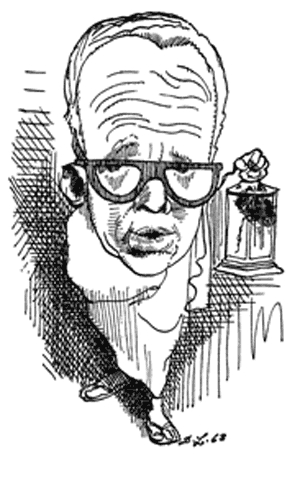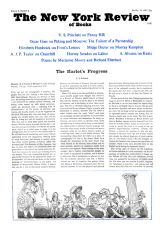“And I should hope that I should never cross a picket line; when men are cold and hungry, it takes someone more principled than I to insult them for no better reason than that they are wrong.”
—Murray Kempton
Not the least funereal aspect of a New York City that has come during the past few years to seem ever more distinctly ashen is the disappearance of Murray Kempton from the pages of the New York Post. Mr. Kempton’s musings on the political and other comedies of our time are still available, to be sure—though in a somewhat altered format—in the New Republic. But the very special place they once occupied in the daily life of New York now stands depressingly (perhaps the word is shamefully) empty. Three times a week, in the bleak years between 1949 and 1963, he broke into the afternoon with a momentarily heightened sense of the reality of things. Sanity has been known to depend on a good deal less.
In spite of the very great comfort of having him around Mr. Kempton at the time did not always seem to be reliably coherent—either from one event or character under discussion to another, or, occasionally, even within the space of a single column. His prose may be the closest thing we have to what the eighteenth century meant by wit; but so much compression when applied to the kind of subjects Mr. Kempton was dealing with sometimes made his observations sound gratuitously tangled or perverse. Moreover, his particular angle of social vision is fixed by the idea that in America what is deemed respectable and what shoddy or criminal is largely a matter of class style—an idea unifying enough, certainly, but one that when worked out in fragments of comment from day to day could look dangerously relativistic. It requires a rare flexibility of maneuver to lay aside the pieties through which, say, the editorial writers of the New York Times have been able to distinguish between such people as the labor racketeers and the business establishment that has happily exploited them. Thus in following the columns one often found the same figure being attacked at one moment and defended the next on the ground that his accusers, though classier, were no better.
Even Mr. Kempton’s most devoted and admiring readers, then, are apt to be surprised by this collection of his Post columns. It turns out that he was, in haphazard sequence, writing a book all those years. Selected and put together between covers, these pieces do something more than collect well. Whichever of them seemed unduly compressed or strained by itself is now revealed as having suffered from a lack of proper context; and whichever of his positions seemed not altogether consistent can now be seen as having been firmly taken, only with respect to a different problem than the one going by the same name that everyone else was concerned with.
America Comes of Middle Age, as its title makes obvious, is a chronicle of the period that historical shorthand symbolizes as The Fifties; in Mr. Kempton’s view, “the saddest because they were the most abject years in the history of the United States.” And their prevailing atmosphere, he says, has been given a mistaken association:
…the Fifties were not the Eisenhower years but the Nixon years. That was the decade when the American lower middle class in the person of this man moved to engrave into the history…its own faltering spirit, its self-pity and its envy, its continual anxiety about what the wrong people might think, its whole peevish, resentful whine. The Nixon years belonged to all the young men who had been to the schools which instructed them that they could not be too careful, to the graduates of those courses in how to influence people since it was no longer of value to win friends…young men ashamed of their origins and of themselves.
The Fifties was the time when among other things our most interesting domestic life was being lived out in a string of Congressional committee hearings, and Mr. Kempton’s rendering of the period naturally emphasizes the dramas and characters, large and small, that come to mind in connection with people like Kefauver, McCarthy, Velde, Robert Kennedy, etc. Our ardor for official exposures has spent itself; much of this account, in anybody else’s telling, might now seem distantly historical and would undoubtedly make some contribution to the self-gratulation that threatens to become the hallmark of the Sixties. But just as nothing was so typical of America’s surrender to “middle age” as the disillusion of liberals with Communists and politicians and labor unions—brought to them weekly through the courtesy of Capitol Hill and the Justice Department—so nothing better represented the kind of wisdom supposed to come with grownup experience than the writing of Murray Kempton. The events presented in this book are not something we once went through and have for the most part left behind; they are shown as constituting for America one of those moments of moral upheaval in which people have the opportunity to discover something of themselves—provided they have both the courage and plain sense to name what they find.
Advertisement
There were moments when I enjoyed McCarthy. That is why he was a serious figure; in his twisted way, he explained to me how I was not serious enough.
The first chapter or section (there are eight, organized by subject) is devoted to a few all-but-forgotten Communists. Putting them first was an important gesture, one that in a way defines Mr. Kempton’s mode as a liberal critic. He had learned, as thoroughly and as early as any of his political semblables, what was wrong with the Communists. The people he discusses here, however, were not the Communists featured in the intellectual discussion of the early and mid-Fifties—the ones gone mindless and “dehumanized” in the service of the Soviet Union. They were Communists who had done such things as work on the Daily Worker for forty dollars a week or who went to jail under the Smith Act. They were, moreover, citizens from whom agencies of the federal government sought to protect our democratic institutions by depriving of such paid-for privileges as veterans-disability and old-age pensions. Mr. Kempton was perfectly willing to risk being thought fuzzy and sentimental in making sad fun of the idea that a little old lady named Elizabeth Gurley Flynn was a menace to the fabric of our society. And he is willing to risk the same charge now by opening his bid to give an account of America in the Cold War with the story of injustices done to some minor individuals.
Along with his anti-Communism he had also learned that life is tragic and that art is long—and had learned it, what is more, as well and truly as the best of his serious contemporaries. But unlike so many of the latter, he did not carry the lesson to what were parading as its inevitable conclusions. He has always operated, not by refusing or rejecting the finest justifications of his culture nor by consciously defending them, but precisely by assimilating them to the point where he can admit that even they do not answer to what the heart of a decent and sensitive man demands.
It was a dear, kind theory, and I am only sorry that it did not prove useful for the long pull. I do not apologize for it; the late Philip Murray was the finest man I have ever known and any cause of his would still be good enough for me.
The above passage, describing his attitude to the New Deal liberalism that had proven for him and everyone else so cruelly inadequate, is neither flip nor frivolous. It locates exactly that quality of spirit that kept Mr. Kempton from the theoretical refinement and ideological coarseness into which, as a member of the American intellectual community in the period under question, he was entitled to fall. This is the very quality of spirit that permits him on the one side to discover the true sociology of the American worker in the fact that no one sees fit to clean the filth off a factory floor rather than in terms like “other-directed consumer” or “upward social mobility.” and that prompts him on the other side to insist on the distinction between William Buckley and Robert Welch. To borrow the phrase he uses in his chapter of celebrations. Mr. Kempton has always known “the name of the game” he is in. It is a game that all liberals are committed to but that few were unabashed enough not to drop out of when things got complicated: it is called the Fair Shake.
He managed to get through the Nixon Age without having given in for more than a moment or two to its almost overpowering seductions: the new theory of a classless America engaged in a religious war against Evil: the all-extenuating “reality” of politics that beckoned, say, to an Arthur Schlesinger; or the retreat into literature that ended by defining only those writers who touched the small emotions as “important.” He entered the period as a labor reporter; and left it as our last best liberal voice. He was always a gifted and satisfying writer: cumulatively, he is a marvelous one. In Mr. Kempton himself, perhaps, more than in what he has communicated of them, lies the best lesson the Fifties have to teach.
This Issue
October 31, 1963




